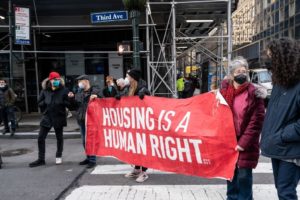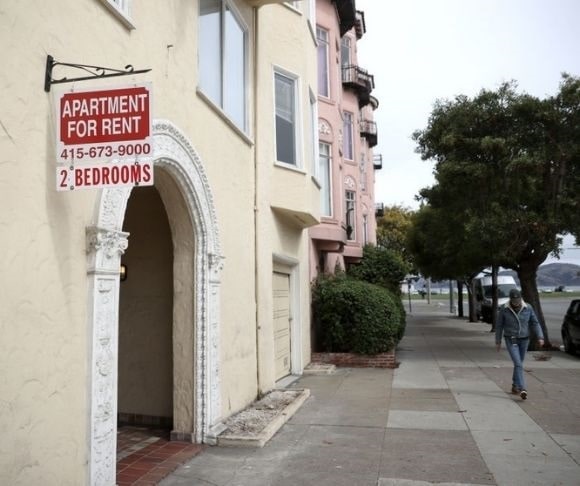At the start of the pandemic, the federal government and many states stepped in to protect American tenants by banning evictions and offering billions of dollars in rental assistance. Looking back two years later, are we sure this was the best course of action? Many Americans lost income due to COVID-19 restrictions or illness itself and would likely have been displaced – but the eviction moratorium brought no pause to mortgage payments for the property owners, many of whom lost their own livelihoods after the promised payout either never came or was too late to save them. While the government interference allowed tenants to live rent-free, landlords were left with two choices: suck it up or sell out.
Eviction Ban Consequences

(Photo by Lev Radin/Pacific Press/LightRocket via Getty Images)
In the early days of the pandemic, the federal government prohibited landlords from evicting renters for failure to pay. That eviction moratorium ended in August, but some local governments kept their own bans in place.
Congress also established a rental assistance program to distribute $46.6 billion to struggling tenants and landlords, though many Americans did not see the money until months after they applied, if at all. The distribution of funds falls to each individual state, so the process moves faster in some parts of the country than in others.
California had one of the greatest needs, with an estimated $3.3 billion owed in back rent. The Golden State received $5.2 billion from the program. The median wait time is 135 days, and only about 60% of applicants ever received their funds, according to the National Equity Atlas. California Department of Housing and Community Development Geoffrey Ross contested the NEA’s figures, however, and promised that “every eligible applicant will get paid.” Property owners hope that’s true and that money will start flowing faster. However, without the right to evict renters for non-payment, they’re left with few options.
One homeowner in Seattle, WA, who put her property up for rent at the end of 2019, is owed $45,000 in back rent and utilities and $18,000 in smoke damages and junk removal. How is she expected to pay her mortgage? She received no help from her local government, and despite the eviction ban being up, the tenants were given a six-month “grace period” in her district that started this month.
Two years into this pandemic, the government has failed to put the nearly $50 billion into Americans’ hands in a reasonable amount of time.
Forced to Sell
With nowhere to turn and bills piling up, local landlords have been forced to offload their properties, and cash-heavy investors turned mega-landlords were happy to take the homes off their hands. Many property owners have been presented a stark choice: take a loss on selling cheap, or lose it all to the bank.
Mega-landlords are also involved in the ibuying business, looking to buy properties off of desperate Americans in need of cash and then rent them out. They claim to offer long-term stability in the real estate market and to fill the gap in rental properties Americans are desperate for. Fair housing advocates argue, however, that big investors further increasing their stake in the game will only lead to higher prices and absent affordable housing. Wall-Street-backed investors are not afraid of unpaid tenants. They have the legal resources to find loopholes in ongoing eviction bans and execute evictions when necessary.
Infringing Property Rights?
 There were numerous pros and cons to the moratorium, saving some lives at the cost of ruining others. But was it legal? Representative Chris Brown, a Republican from Kansas City, doesn’t think so. At a hearing for House Bill 1682, which argues no court shall create or enforce an eviction moratorium unless authorized to by the state, Rep. Brown called the federal ban “a clear violation of contract law and property rights.” The interference, in this case, “puts landlords in an unfair situation,” Brown explained. “We talk a lot about government or bureaucratic agencies picking winners and losers. And I certainly felt like that was done unlawfully.”
There were numerous pros and cons to the moratorium, saving some lives at the cost of ruining others. But was it legal? Representative Chris Brown, a Republican from Kansas City, doesn’t think so. At a hearing for House Bill 1682, which argues no court shall create or enforce an eviction moratorium unless authorized to by the state, Rep. Brown called the federal ban “a clear violation of contract law and property rights.” The interference, in this case, “puts landlords in an unfair situation,” Brown explained. “We talk a lot about government or bureaucratic agencies picking winners and losers. And I certainly felt like that was done unlawfully.”
HR 1682 likely faces an uphill battle; attempts to revoke government assistance are rarely popular and almost never succeed. Even if eviction bans become prohibited by federal law, however, the damage is done. For those who lost their livelihoods and land in the era of COVID, it’s one more stain left to linger long after the government walks away from its mess.
~Read more from Keelin Ferris.




